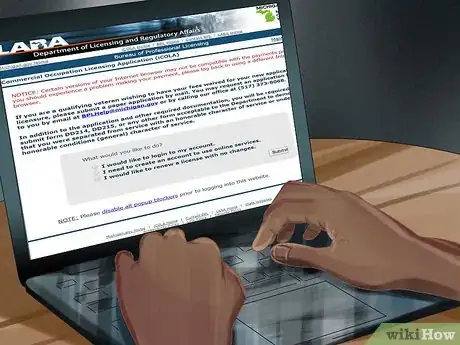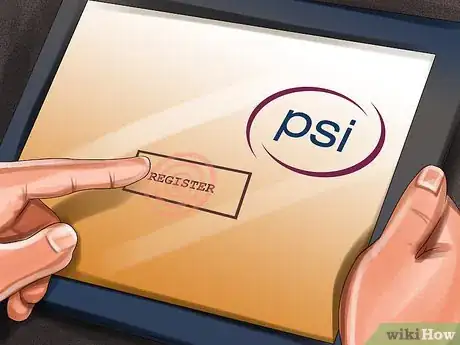This article was co-authored by wikiHow staff writer, Amy Bobinger. Amy Bobinger has been a writer and editor at wikiHow since 2017. She especially enjoys writing articles that help people overcome interpersonal hurdles but frequently covers a variety of subjects, including health and wellness, spirituality, gardening, and more. Amy graduated with a B.A. in English Lit from Mississippi College in 2011 and now lives in her hometown with her husband and two young sons.
wikiHow marks an article as reader-approved once it receives enough positive feedback. In this case, 91% of readers who voted found the article helpful, earning it our reader-approved status.
This article has been viewed 153,740 times.
Learn more...
Michigan is a state full of stunning mountain vistas, thousands of miles of beaches, charming small towns, and vibrant big cities.[1] The diverse settings you'll find in Michigan offer unlimited real estate opportunities to residents. If you want to become a real estate agent in Michigan, take the appropriate classes at a local college, pass the licensing exam, and choose whether you want to work in commercial or residential real estate.
Steps
Qualifying to Become a Licensed Real Estate Agent
-
1Meet the age requirement. You'll need to be at least 18 years old in order to be an applicant for a Michigan real estate salesperson license. You are not required to have a high school degree in order to be licensed, but you may be required to have a degree or GED in order to sign up for college courses.[2]
-
2Take 40 hours of prelicensure classes at a local college. You'll need to take 40 hours of real estate fundamentals courses in order to become a licensed real estate agent. At least 4 of those hours must include Civil Rights Law and Equal Opportunity in Housing.[3]
- Other approved courses include Fundamentals of Real Estate, Real Estate Law, and Principles and Practices of Real Estate.
- After you have successfully completed your classes, your school will submit a certificate of completion to the state of Michigan.
Advertisement -
3Get broker affiliation. Broker affiliation means that you are employed by a licensed broker. You'll need broker affiliation before you can become licensed. After you finish college, you can use online job boards or your college's career center to find brokers who are hiring.
- When you interview with different brokers, ask questions to determine how hands-on they will be in helping you build your career. Choose a broker with a good reputation in the area and several years of experience in the field.
-
4Complete your salesperson license application at iCOLA. The state of Michigan handles their licensing through a website known as iCOLA. When you access iCOLA (https://www.lara.michigan.gov/icola/Entry), you will need to create a User ID and 8-character password. Fill out your salesperson application and submit it along with the $88 fee.[4]
- If you are employed by a broker, you can list their 10-digit broker identification number on your application. Have the broker log into their iCOLA account to confirm that they are sponsoring you.
- If you are not employed by a broker, your application will remain in pending status until you become sponsored, or for up to 1 year. When you find a broker sponsorship, fill out the Employing Broker Notification form with Michigan's Department of Licensing and Regulatory Affairs (LARA).
Taking the Licensing Exam
-
1Use prep materials from PSI to study for the exam. The Michigan's real estate licensing exam is administered by PSI. PSI offers a number of study materials for their exams on their website. Start with the Candidate Information Bulletin and use the examination content outline to cover the basics of the test. You can also purchase additional prep materials at http://www.psionlinestore.com/.
- To make the most of your study time, find a quiet place free of noise or distractions. Set aside an hour or two a day for several weeks prior to the exam to make sure you are ready when test day comes.
-
2Register for the test with PSI. If your salesperson application is approved, you will receive an email from the State of Michigan which includes instructions on how to register for your licensing exam. The email will include a unique 6-digit number known as your Michigan Real Estate (or MIRE) number, which is required to register for the test. You must pay a $76 fee at the time that you register. You will also schedule your exam at this time.[5]
-
3Pass the test with a score of at least 70%. The license examination is a closed-book, computer based test that covers 110 questions and lasts 180 minutes. You will be allowed 15 minutes to complete a tutorial to ensure you understand the format of the test. This time will not count against the time allowed for the test. You must receive a score of 70% to pass.[6]
- The test covers subjects you should have studied in your prelicensure courses, such as property ownership, land use controls and regulations, market analysis, and financing. If you paid attention in school and use your study time wisely, you should be familiar with the information covered on the test.[7]
- If you pass the exam, you can receive an on-site license at the examination site, meaning you can practice real estate immediately if you already have a broker!
Being Successful in the Michigan Real Estate Market
-
1Study the real estate market in different areas of Michigan. Once you become licensed, you should decide where in Michigan you want to settle. If you like the hustle of urban life, you may be interested in helping businesses find a home in revitalized Detroit. If luxury and the outdoors are more your speed, you might be more interested in helping ski buffs find their perfect winter lodge in the Upper Peninsula.
-
2Choose to work in commercial real estate if you love to travel. Commercial real estate will give you a lot of opportunities to visit different parts of the state, helping business owners find the perfect spot for their operation. You might help a Michelin-star chef find a spot for a new restaurant in Ann Arbor one day and settle a nonprofit into a warehouse space in Detroit the next!
-
3Focus on residential real estate if you want to focus on one location. Residential real estate agents tend to focus on one area, becoming intimately familiar with the different neighborhoods, school districts, and other local amenities. By studying an area, you'll be able to recommend the perfect suburban starter home for a young family or a chic downtown loft for a busy professional.
-
4Build your portfolio by reaching out to your friends and family. When you're first getting started, you can start building your portfolio by asking the people closest to you if they know anyone who is looking to buy a home. Your broker will also help you come into contact with potential clients.[8]
-
5Encourage buyers to embrace Michigan winters. You may come across some buyers from out of the area who are thinking of relocating to Michigan but who are hesitant to take on lake effect snow. If this is the case, show them brochures of idyllic snow-covered landscapes, describe cozy white Christmases, and let them know that they'll adapt to the weather more easily than they think.[9]
-
6Show clients the revitalization in Detroit if they are wary about its past. Although Detroit was hit hard in the last recession, there's a reason it's now being called America's Great Comeback City. If you have a potential buyer who is wary about settling in Motor City, show them the new businesses that are helping the local economy to grow, especially around Midtown.[10]
Community Q&A
-
QuestionDo I have to live in MI to get a license? We will be relocating their within the year and I want to get started on obtaining the appropriate certification.
 Community AnswerNo, it does not matter what state you are a resident of. Lots or realtors are licensed in multiple states.
Community AnswerNo, it does not matter what state you are a resident of. Lots or realtors are licensed in multiple states. -
QuestionCan I finish the 40-hour online course in a week?
 Community AnswerIf you have 40 hours to spare, and the energy and motivation to do so, sure.
Community AnswerIf you have 40 hours to spare, and the energy and motivation to do so, sure. -
QuestionDo I need to be employed by a broker?
 Community AnswerYes, to be an agent you must be employed by a broker or firm.
Community AnswerYes, to be an agent you must be employed by a broker or firm.
References
- ↑ http://www.michigan.gov/som/0,4669,7-192-26847-103397--,00.html
- ↑ http://www.michigan.gov/documents/lara/Real_Estate_517670_7.pdf
- ↑ http://www.michigan.gov/documents/lara/Real_Estate_517670_7.pdf
- ↑ http://www.michigan.gov/documents/lara/Real_Estate_517670_7.pdf
- ↑ https://candidate.psiexams.com/bulletin/display_bulletin.jsp?ro=yes&actionname=83&bulletinid=209&bulletinurl=.pdf
- ↑ https://candidate.psiexams.com/bulletin/display_bulletin.jsp?ro=yes&actionname=83&bulletinid=209&bulletinurl=.pdf
- ↑ https://candidate.psiexams.com/bulletin/display_bulletin.jsp?ro=yes&actionname=83&bulletinid=209&bulletinurl=.pdf
- ↑ https://www.bls.gov/ooh/sales/real-estate-brokers-and-sales-agents.htm
- ↑ https://www.michigan.org/about-us






































































